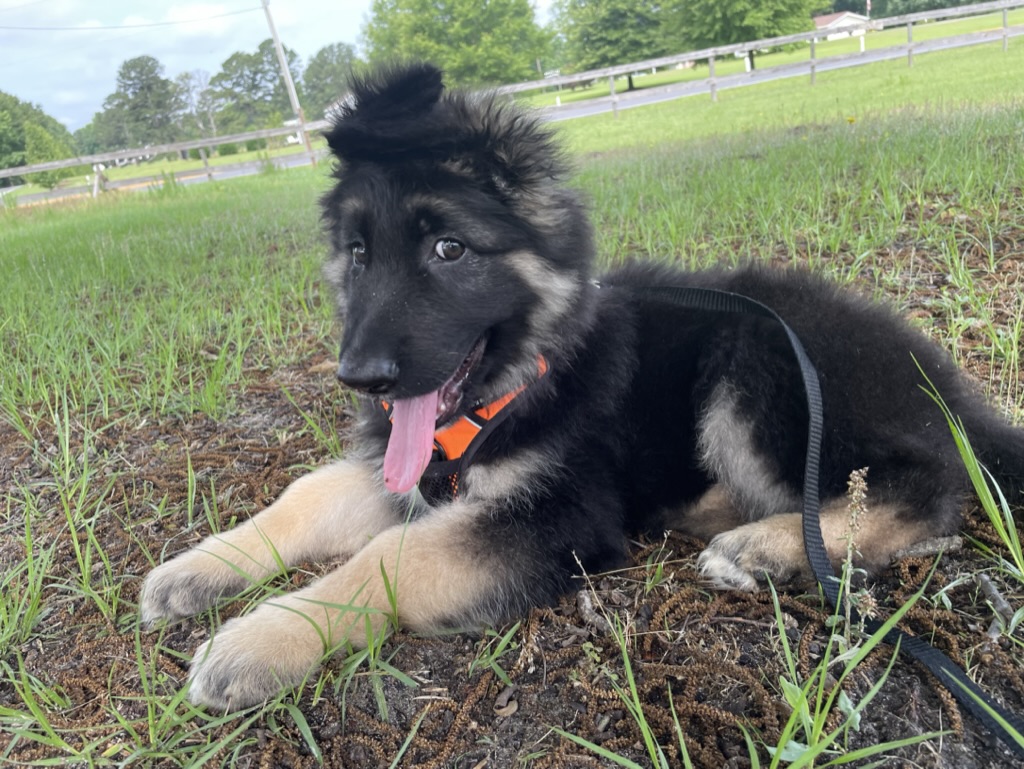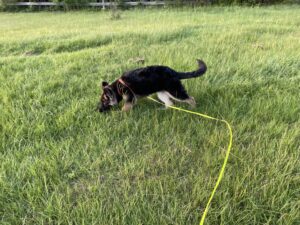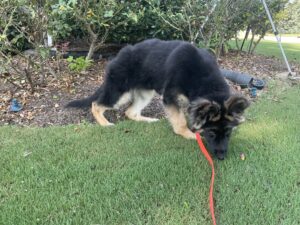Why won’t my puppy stop chewing on me??
Puppy biting and mouthing are expected and healthy parts of development, driven by a variety of factors.
- Exploration & learning. Puppies use their mouths to explore their world, much like human babies use their hands.
- Teething! Puppies lose their puppy teeth throughout their puppyhood and early adolescence, and adult teeth grow in their place. Teething is uncomfortable to downright painful, and biting things of varying textures helps ease that discomfort.
- Play and social interactions are essential for developing puppies. They often use their mouths to play—which is far more comfortable when you have a thick fur coat to protect you from their little knife teeth.
- Over-tiredness & frustration. When puppies are overstimulated or tired, they can struggle to regulate frustration—they might even have “tantrums” like human toddlers.
- Bite inhibition doesn’t come pre-installed (although some breeds are bred to have softer mouths than others). Puppies need lots of practice biting to understand both how to bite softly, and the value in being gentle.
How to Survive Shark Month(s)
Puppies are going to bite and mouth—that’s just a fact of life. But that doesn’t mean we have to be a pincushion for weeks on end! Here are my go-to puppy survival strategies to prevent and reduce biting:
- Create a puppy-free safe zone – for you! This can be behind a baby gate, exercise pen, or closed door. If your puppy can’t help herself and nothing is working to stop the biting—it’s time to leave. You can either put your puppy down for a nap, or put yourself down for one!
- Have an abundance of chews with various textures and materials. This helps ensure you have a toy for every type of teething pain—molars, canines, incisors, etc.
- If you notice your puppy obsessively chewing a specific inappropriate item, try to provide a chew of similar texture. For example, dogs obsessed with socks may be lacking fabric or plush toys to chew. Dogs obsessed with furniture might do better with a Gorilla Chew made of wood pulp.
- Nap time. If you notice your puppy is overtired, or it’s been a while since their last nap—time to sleep. Crate training can help reinforce naps for dogs who struggle to “turn off”
- Social time. Having access to a well-socialized adult dog that is open to having puppies chew on them a bit is incredibly valuable. Well-socialized adults set age-appropriate boundaries, communicate when teeth are too rough, and give puppies plenty of grace while they are still learning how to dog (the “puppy pass”).
In the Moment: What to Do When Teeth Hit Skin
Even with the best prevention strategies, you’re still going to feel those little knife-teeth now and then. When biting happens, here are my go-to responses to keep things calm, clear, and constructive:
- Respond calmly. Bringing attention to unwanted biting encourages it—the phrase “any attention is good attention” applies here.
- Some people may recommend yelping or crying out when your puppy bites—you are welcome to try this out, but be aware that some puppies will like this response and end up biting more.
- Redirect mouthing to more appropriate outlets. Give your puppy something to chew on when they need some teething relief. Freezable toys work wonders for sore gums!
- Edible chews, like turkey tendons or puppy-appropriate chew treats are tried and true.
- Puppy teeth are fragile—and so are newly emerging adult teeth. Do not give your puppy or adolescent anything that is too hard to make an indent in with your fingernail. Absolutely no antlers, weight-bearing hard bones, cooked—wait until they’re older to save thousands on dental care!
- Play with your puppy after they “fill their face” and have a toy in their mouth. If the toy comes out, stop play until they re-engage with the toy.
- If your puppy is disinterested in the toy, try changing your toy or your play tactics. Many dogs dislike having toys shoved in their mouths, so try encouraging your puppy to chase the toy instead.
- Long rope-like toys can be tantalizing for dogs, and are an excellent way to get your pup’s teeth on something more appropriate.
My puppy just turned into a demon dog out of nowhere!
Take a breath, and head to your puppy free zone for a few moments of peace! Behavior always comes from somewhere—we just need to figure out where. If your sweet little fuzzball has turned into a flurry of teeth, there’s a good chance they’ve got an unmet need somewhere.
- Have they had enough sleep?
- Are they hungry? Thirsty?
- Do they need to potty? Are they having any gut or health issues?
- Have they had enough exercise? What about mental exercise?
- Are they in any pain—teething pain, growing pain, perhaps? Growing pains can be common in large breeds.
Go through the checklist, and try to address any underlying issues that may be at play. When in doubt, your puppy probably needs a nap—overtired puppies are not a pretty sight.
He just won’t stop biting! Nothing is working!
If it feels like you’ve tried everything and nothing is working, it’s time to get some help. Puppyhood may have its challenges, but it shouldn’t feel overwhelming or helpless. If it feels like things are getting out of hand—don’t hesitate to reach out!
You’ve got this. Raising a puppy is no joke, but you don’t have to do it alone. We’re here to help! 🙂



